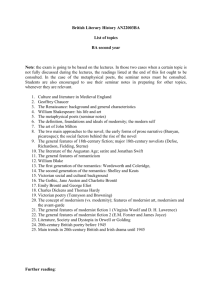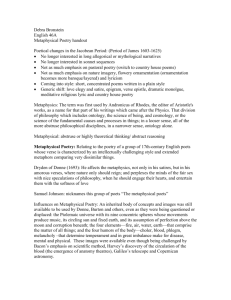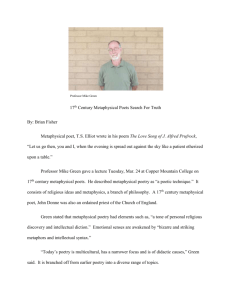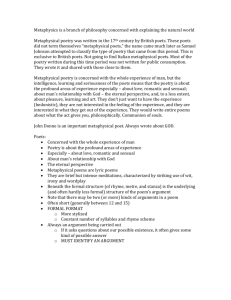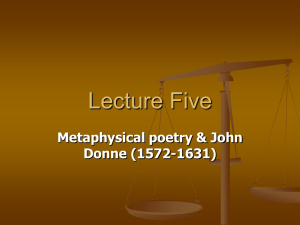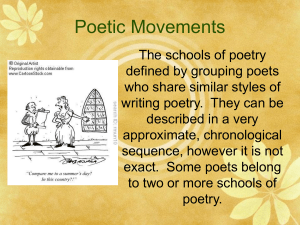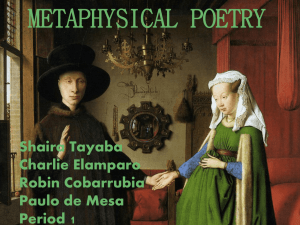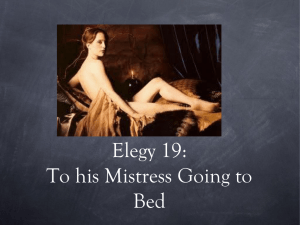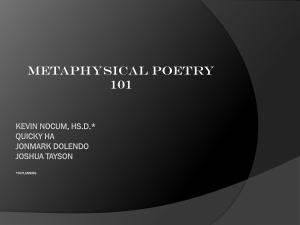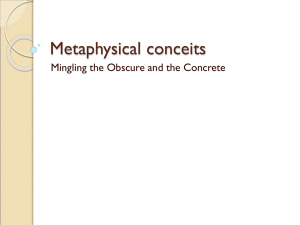Metaphysical Poetry
advertisement
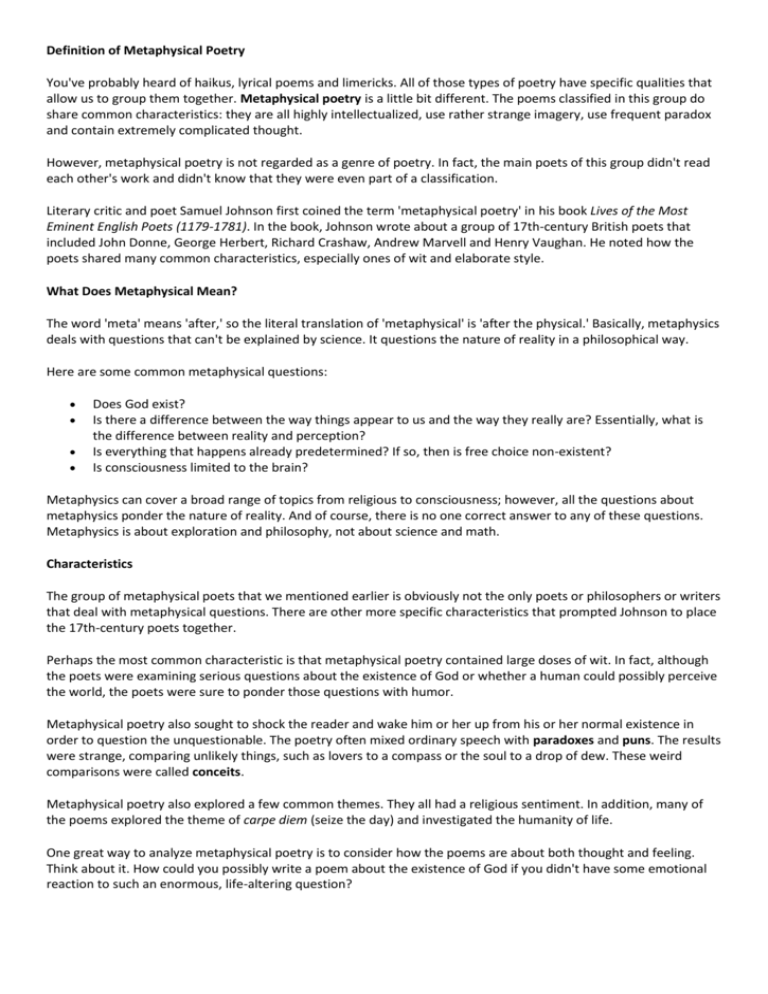
Definition of Metaphysical Poetry You've probably heard of haikus, lyrical poems and limericks. All of those types of poetry have specific qualities that allow us to group them together. Metaphysical poetry is a little bit different. The poems classified in this group do share common characteristics: they are all highly intellectualized, use rather strange imagery, use frequent paradox and contain extremely complicated thought. However, metaphysical poetry is not regarded as a genre of poetry. In fact, the main poets of this group didn't read each other's work and didn't know that they were even part of a classification. Literary critic and poet Samuel Johnson first coined the term 'metaphysical poetry' in his book Lives of the Most Eminent English Poets (1179-1781). In the book, Johnson wrote about a group of 17th-century British poets that included John Donne, George Herbert, Richard Crashaw, Andrew Marvell and Henry Vaughan. He noted how the poets shared many common characteristics, especially ones of wit and elaborate style. What Does Metaphysical Mean? The word 'meta' means 'after,' so the literal translation of 'metaphysical' is 'after the physical.' Basically, metaphysics deals with questions that can't be explained by science. It questions the nature of reality in a philosophical way. Here are some common metaphysical questions: Does God exist? Is there a difference between the way things appear to us and the way they really are? Essentially, what is the difference between reality and perception? Is everything that happens already predetermined? If so, then is free choice non-existent? Is consciousness limited to the brain? Metaphysics can cover a broad range of topics from religious to consciousness; however, all the questions about metaphysics ponder the nature of reality. And of course, there is no one correct answer to any of these questions. Metaphysics is about exploration and philosophy, not about science and math. Characteristics The group of metaphysical poets that we mentioned earlier is obviously not the only poets or philosophers or writers that deal with metaphysical questions. There are other more specific characteristics that prompted Johnson to place the 17th-century poets together. Perhaps the most common characteristic is that metaphysical poetry contained large doses of wit. In fact, although the poets were examining serious questions about the existence of God or whether a human could possibly perceive the world, the poets were sure to ponder those questions with humor. Metaphysical poetry also sought to shock the reader and wake him or her up from his or her normal existence in order to question the unquestionable. The poetry often mixed ordinary speech with paradoxes and puns. The results were strange, comparing unlikely things, such as lovers to a compass or the soul to a drop of dew. These weird comparisons were called conceits. Metaphysical poetry also explored a few common themes. They all had a religious sentiment. In addition, many of the poems explored the theme of carpe diem (seize the day) and investigated the humanity of life. One great way to analyze metaphysical poetry is to consider how the poems are about both thought and feeling. Think about it. How could you possibly write a poem about the existence of God if you didn't have some emotional reaction to such an enormous, life-altering question? John Donne (1572-1631) All conversations about metaphysical poetry must start with John Donne. He is considered the founder of metaphysical poetry and master of the metaphysical conceit. Donne was not only a poet but a lawyer, priest and satirist. His poetry reflects this diversity, and his works are just as religious as they are funny. Donne explored the idea of religion his whole life, and despite being a priest, spent a lot of time examining the idea of true religion. We can trace these questions back to his upbringing. Donne was born and raised a Roman Catholic when it was illegal to be Catholic in England. He lost many relatives to martyrdom - they were either exiled or executed JOHN DONNE AND THE BEGINNING OF THE 'METAPHYSICAL' POETRY. The last decade of the sixteenth century presents also, in the poems of John Donne, a new and very strange style of verse. Donne, born in 1573, possessed one of the keenest and most powerful intellects of the time, but his early manhood was largely wasted in dissipation, though he studied theology and law and seems to have seen military service. It was during this period that he wrote his love poems. Then, while living with his wife and children in uncertain dependence on noble patrons, he turned to religious poetry. At last he entered the Church, became famous as one of the most eloquent preachers of the time, and through the favor of King James was rapidly promoted until he was made Dean of St. Paul's Cathedral. He died in 1631 after having furnished a striking instance of the fantastic morbidness of the period (post-Elizabethan) by having his picture painted as he stood wrapped in his shroud on a funeral urn. The distinguishing general characteristic of Donne's poetry is the remarkable combination of an aggressive intellectuality with the lyric form and spirit. Whether true poetry or mere intellectual cleverness is the predominant element may reasonably be questioned; but on many readers Donne's verse exercises a unique attraction. Its definite peculiarities are outstanding: 1. By a process of extreme exaggeration and minute elaboration Donne carries the Elizabethan conceits almost to the farthest possible limit, achieving what Samuel Johnson two centuries later described as 'enormous and disgusting hyperboles.' 2. In so doing he makes relentless use of the intellect and of verbally precise but actually preposterous logic, striking out astonishingly brilliant but utterly fantastic flashes of wit. 3. He draws the material of his figures of speech from highly unpoetical sources--partly from the activities of everyday life, but especially from all the sciences and school-knowledge of the time. The material is abstract, but Donne gives it full poetic concrete picturesqueness. Thus he speaks of one spirit overtaking another at death as one bullet shot out of a gun may overtake another which has lesser velocity but was earlier discharged. It was because of these last two characteristics that Dr. Johnson applied to Donne and his followers the rather clumsy name of 'Metaphysical' (Philosophical) poets. 'Fantastic' would have been a better word. 4. In vigorous reaction against the sometimes nerveless melody of most contemporary poets Donne often makes his verse as ruggedly condensed (often as obscure) and as harsh as possible. Its wrenched accents and slurred syllables sometimes appear absolutely unmetrical, but it seems that Donne generally followed subtle rhythmical ideas of his own. He adds to the appearance of irregularity by experimenting with a large number of lyric stanza forms--a different form, in fact, for nearly every poem. 5. In his love poems, while his sentiment is often Petrarchan, he often emphasizes also the English note of independence, taking as a favorite theme the incredible fickleness of woman. In spirit Donne belongs much less to Elizabethan poetry than to the following period, in which nearly half his life fell. Of his great influence on the poetry of that period we shall speak in the proper place
